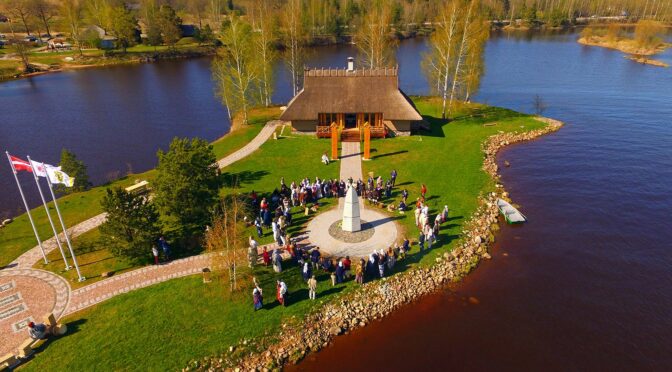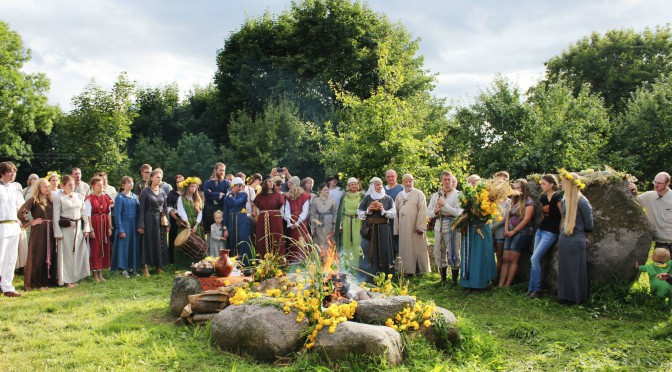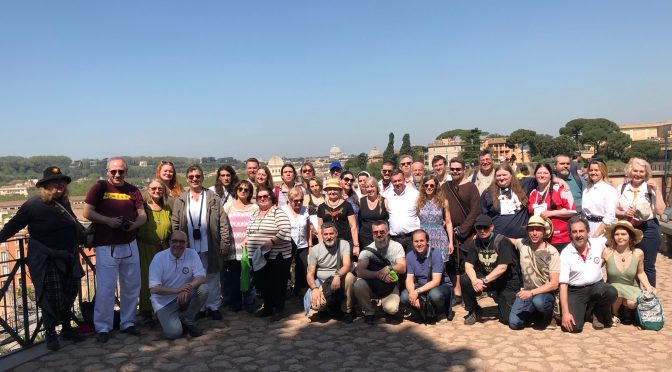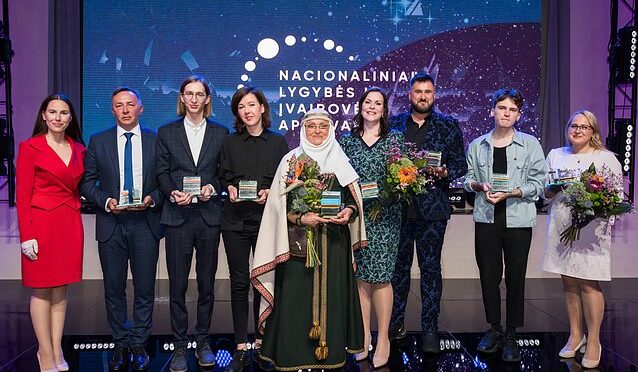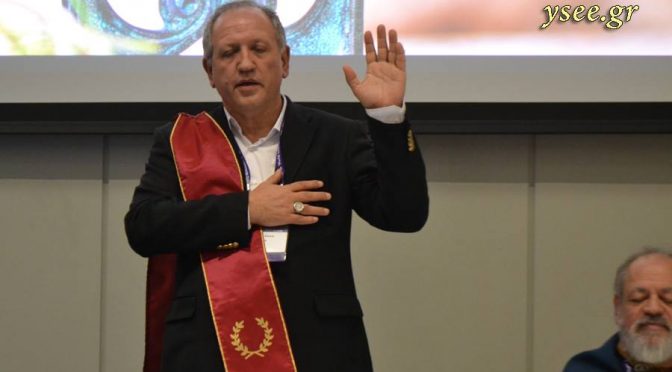We, the delegates from 17 different countries convened at the European Congress of Ethnic Religions in Rīga, Latvia, on June 30, 2023, join our voices together to make the following declaration:
We, the undersigned, represent religious communities upholding the traditional, ethnic religions of diverse peoples of Europe. We hold deep reverence for our ancestors, the Gods and Goddesses they worshiped and the worldview and values that they bequeathed to us. Our spiritual traditions are inseparable from our traditional culture, and both require support and protection.
We call on all the governments of the nations of Europe and the European Union to grant our religions the same respect and privileges that are accorded to other religions in European societies and legal systems. We ask for the following specific measures:
1. Special governmental protection and support as a part of indigenous culture, that is humanity’s cultural heritage;
2. A legal status protected by the state (including determining it by a special law) which is not evaluated and compared according to the criteria of other religions;
3. Perform ceremonies at, and use the ancient sacred sites, for example, if there is no church built on it, while respecting the rules of protection for the archaeological sites;
Life cycle rites must be accessible according to our traditions and protected;
4. Perform wedding ceremonies with legal authority in countries where the governing law recognizes these ceremonies done by recognized religions;
5. Practices towards the end of life, including but not limited to, visiting the ill and spiritual care, cooperation with hospitals, cemeteries and funerary rituals according to our traditions must be protected;
6. Our festival and celebration dates enshrined in law and shown in calendar;
7. When there is religious education in public schools, guarantee the freedom of choice to either abstain from, or participate in the religious studies depending on the cultural heritage of the country;
8. Chaplaincy — right to appoint the chaplains;
9. Broadcast time slot in public media;
10. Tax relief or exemption for our religious organization;
11. Safeguarding us from the influence of globalization consequences, persecution, and discrimination by other religious organizations due to their cosmopolitan status;
12. Institutions must respect the local sacred languages and traditions, taking us into account as the local identity of the indigenous European people;
13. Safeguarding the nature around the sacred places;
14. The sacred natural sites must be a category of protection on its own — combining both natural sites and archaeologic sites — this allows using such places for the practice of traditional religions and protecting them from harmful human activity;
15. Respect of sacred land, and protection from mining companies, resource and land expropriation;
16. Igniting, maintaining, observing and using sacred fires and bonfires in open-air setting during our ceremonies must be permitted and protected as part of our tradition and religious freedom in harmony with nature’s needs;
17. When there is evidence of discrimination, or institutional silence towards requests of recognition of ethnic religions, we as the ECER, will encourage the local government in writing from the Presidency of the Congress, calling upon their willingness to protect and respect the rights of everyone by responding to the request.
It is essential that our governments and the European Union guarantee certain rights and protection for religions based on ethnic cultures within their homelands. By doing so, they can ensure the preservation and continuity of our ancestral traditions. We believe that the recognition and protection of our ancient religions will contribute to the preservation of our unique identities and the cultivation of a more inclusive society. Together, let us strive for the acknowledgment and safeguarding of our ancient religions, rooted in our ancestral cultures, so that they may thrive for generations to come.
Mēs esam nu kungi mūsu dzimtajā zemē, Mēs varam nu paši sev likumus lemt:
Tā zeme ir mūsu, ir mūsu — jā gan! — Mēs negribam lūgt to, kas mūsu, bet ņemt!
We send this message in kinship, love, and respect.
Member organizations (represented by):
Latvijas Dievturu sadraudze, Latvia (Andrejs Broks, Ansis Bērziņš, Uģis Nastevičs)
Associazione Tradizionale Pietas — Pietas Comunità Gentile, Italy (Giuseppe Barbera, Florian Ransford, Lorenzo Facciuoli, Varveri Basilio Salvo, Yuri Gavriliouk)
Groupe Druidique des Gaules, France (Manquat Jean Lionel)
Об`єднання рідновірів України, Ukraine (Галина Лозко, Ганна Андрощук)
Związek Wyznaniowy Rodzima Wiara, Poland (Judyta Król, Piotr Brzeziński)
Senovės baltų religinė bendrija Romuva, Lithuania (Inija Trinkūnienė, Benas Barzdžius)
Sjamanistisk Forbund, Norway (Kyrre Gram Franck, Kjell Henrik Gove, Knut Fuglesteg)
Slovanský kruh, Czech Republic (Lukáš Pajer, Marianna Gorroňová, Jakub Krejčíř)
Societas Hesperiana Pro Cultu Deorum, Italy (Federico Fregni, Giuliano Gregorio)
Werkgroep Traditie Vzw, Flanders (Belgium) and The Netherlands (Brenda Lioris, Elisabeth Overgaauw, Heide-Marie Piette, Luc Janssens, Nina Bukala, Thomas Slembrouck, Jorres De Vriendt)
Ύπατο Συμβούλιο των Ελλήνων Εθνικών, Greece (Ιωάννης Μπαντέκας)
Observer organizations (represented by):
Arktisk Sjamansirkel, Norway (Øyvind Siljeholm)
Česká pohanská společnost, Czech Republic (Giuseppe Maiello)
International Center for Cultural Studies, United Kingdom (Jacob Moss)
Latvju dievturu sadraudze, United States (Andris Rūtiņš)
Lietuvių etninės kultūros draugija, Lithuania (Virginijus Kašinskas)
Mythology Corner, United States (Ghanasyam Akella)
Slované, Czech Republic (Nami Maria Lada, Svatava Kollmannová)
Väkikunta, Finland (Patrick O’Rourke)
Ύπατο Συμβούλιο Ελλήνων Εθνικών Ρόδου – “Τελχινίς”, Rhodes, Greece (Βαγγέλης Αλεξανδρής, Ιωάννης Μπαχάς, Φοιβαίος Εμμανουήλ Αθανασούλας)
This Declaration is also supported by individuals:
Michael Strmiska, Ph.D., SUNY-Orange, USA, scholar
Prudence Priest, Romuva Ambassadress to the USA
後藤正英, Ph.D., Japan, scholar
…
The new board of the ECER elected on Jun 30, 2023 in Rīga, Latvia:
Brenda Lioris
Giuseppe Barbera
Giuseppe Maiello
Inija Trinkūnienė
Ιωάννης Μπαντέκας
Kyrre Gram Franck
Uģis Nastevičs
Running for president:
Inija Trinkūnienė
Uģis Nastevičs
The elected president:
Uģis Nastevičs


